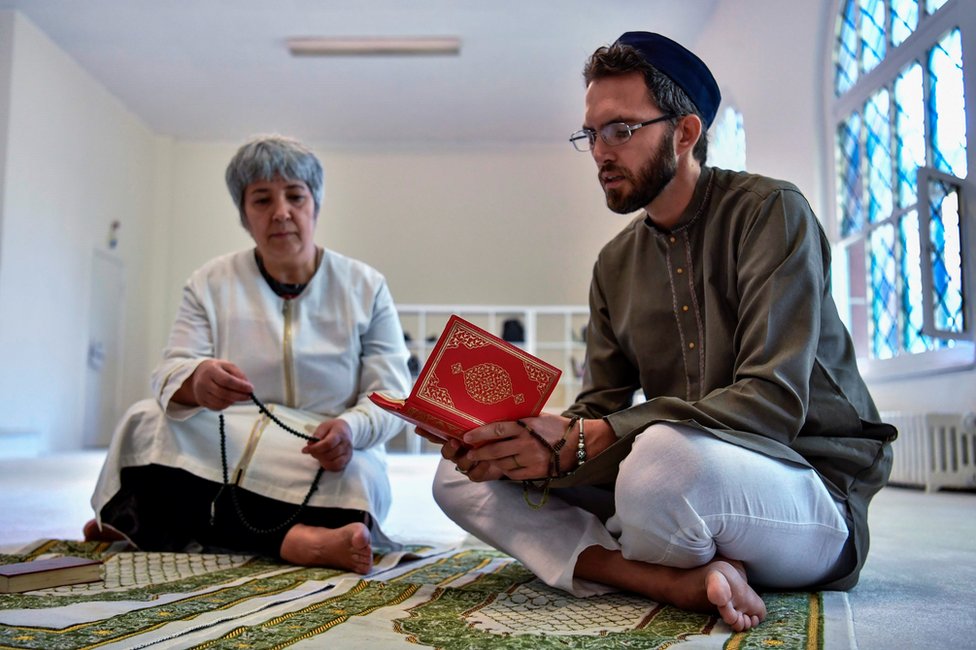
Credit: Getty Images
When Muslim feminist SEYRAN ATES opened a liberal mosque in Berlin this summer she was met with a barrage of death threats and fatwas. But she says she is undeterred in her campaign to use enlightenment values to defeat extremism – in all forms
I have been beaten up in the street, received death threats and had fatwas issued against me since I opened a mosque in Berlin where men and women, and people who are LGBT, can pray together to explore a liberal version of Islam.
Ibn Rushd-Goethe mosque – named after the Andalusian Muslim polymath who became an acclaimed scholar of Greek philosophy and the great German writer who had a deep interest in eastern writing – has experienced a backlash from conservative clerics.
The Egyptian state-run religious institution Dar al-Ifta al-Misriyyah, declared that Islam does not allow men and women to pray together and the Al-Azhar University’s jurisprudence department issued a fatwa against me. The main religious authority in Turkey, Diyanet, attacked what was being practised at our mosque as ‘nothing more than depraving and ruining religion’. A religious institution in Hamburg has also joined in the denunciation.
So there are insults and threats. But there are also the 300 supportive emails I receive a day from people from all over the world, and all religions – or none. It is this encouragement which makes me think that I should stay involved in fighting for the rights of other people and against those who want to suppress those rights.
I recently visited Britain where I met community leaders, politicians and influencers to seek help setting up mosques where worshippers are not segregated by their gender. It is part of a wider campaign for tolerance and dialogue, and against extremism in religion and politics.
We are very open to talking with conservative Muslims. They too must be worried that terrorists are trying to hijack Islam. The majority of Muslims want to show that Islam is a peaceful, spiritual and beautiful religion.
I would therefore encourage people to understand that Islam is not the problem – extremism is. It is often the least devout individuals who become Islamist extremists. I frequently observe hate-filled individuals in mosques that are funded by states like Qatar or radical fundamentalists from Turkey, where there is agitation against freedom and democracy, education and against gender equality. Supporters of the radical Islamic Muslim Brotherhood are engaging propaganda against tolerance and ‘unbelievers’. I would submit that Islam is not an inherently violent faith, but that it has been exploited by extremists who have twisted the verses to suit their political goals. Muslims need to confront these extremist interpretations and reclaim Islam. We need our own enlightenment.
Initiatives from within Muslim communities such as the #MyIslam campaign are crucial to creating a sense of belonging for individuals who feel forgotten or excluded in our fast-moving world. Only by offering strong alternatives to the Islamist extremist interpretations of the Qu’ran will we win back the hearts and minds of vulnerable individuals. In more tactical terms, we need a complete saturation of the information sphere with counter-messaging and alternative interpretations. Only then can we stop opportunistic, low-grade terror attacks.
To starve ISIS of its emotional appeal, our response needs to show more commitment to and confidence in the enlightenment values of liberty, equality and fraternity that were under attack recently in Berlin, Nice, London, Manchester and Barcelona – amongst others. Otherwise, extremists will watch gleefully as we cripple our human rights policies and cut down civic liberties.
Extremism is widely spread over society, appearing in many different guises: it can be religiously motivated, it can be politically motivated, it can be discriminating or it can be simply hateful and dumb. Extreme left-wingers riot in Berlin-Kreuzberg every year and put the fear of God into innocent citizens who just want to celebrate their national holiday on May Day. In Eastern Germany, extreme right-wingers torch refugee hostels or swing at those who look like foreigners to their minds.
What all these types have in common is the fact they are opposed to fundamental values of enlightened Europeans, they threaten our freedom and they harm our souls. Extremists engender hatred and sow discord. Extremism is a hindrance to integration and the free development of children and adults.
That is why I signed up the ‘Stop Extremism’ initiative at the European Commission (www.stopextremism.eu), which aims to create an EU guideline which would close existing loopholes in the fight against extremism and implement effective protection against it. For this we built upon a solid, legal foundation: the European Charter of Fundamental Rights. We want to ensure that extremism within the EU is registered and eliminated. Our intention is to create transparency regarding its financing, protect employees from it and ensure damages for its victims.
The draft guidelines are not set in stone but are what they are – a draft. With our initiative, we want to encourage discussions. The spirit of the European Charter of Fundamental rights has been our guiding principle. We propose a counterpoint to all forms of extremism, not just Islamic extremism. It is also aimed at extreme right-wing groups, racists and anti-Semites. There is, we think, a reaction against extremism in Europe and people have until June 12 next year to sign our petition to show that support. I have lived with the threat of being attacked for many years. My very existence has become a victim of extremism. I require armed personal protection, I cannot move independently, I have to hide away, and I cannot travel freely – because I dared to raise my voice against extremists and religious fundamentalists. I am a living example that the cancer of extremism needs to be cauterised with the utmost efficiency.
Seyran Ates is a German lawyer and human rights campaigner, of Turkish descent; to find out more about the campaign, visit www.stopextremism.eu









